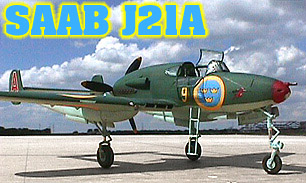 |
| On July 30th 1943, SAAB's prototype
J21 took to the sky for the first time. 198 examples were produced from
1945 to 1948 and remained in service until 1952. It was also one of
only two aircraft to be converted into a jet successfully (the J21R),
the other being the Yak-3. |
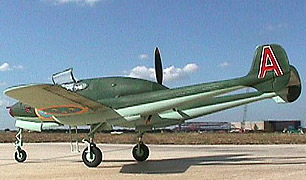 |
| This twin-boom "pusher" never received
an official name, and unfortunately, it's unofficial names are impossible
to translate to English. |
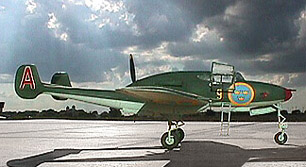 |
| I was informed by a Helsingborg
resident that my kit was pretty convincing, but "the weather was WAY
too good for Sweden". What a Besserwisser (wiseguy). We're lucky if
we get more than two days of snow each year in this part of Texas!
I took this shot as a rainstorm was about to hit, that's about the best
I can do in July! (I tried) |
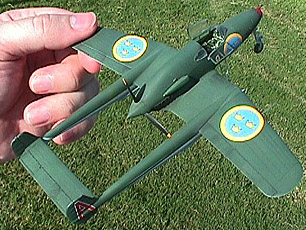 |
| The J21A was powered by a Swedish
built Daimler-Benz DB605B developing 1475 HP. (The is the same engine
as in the Messerschmitt Bf 109G)
The Swedish built engine had problems with overheating when idling on
the ground. Ground crew routinely had to water down the underside of
the midwing to keep it cool.
Despite this and other shortcomings, pilots appreciated its exceptionally
small turning radius and great stall characteristics. It was easy to
land and take off, had a comfortable cockpit, and had the best escape
system of the time. |
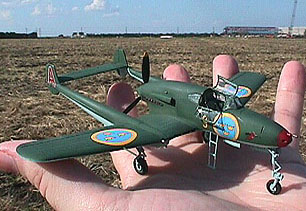 |
The J21 was an excellent gun platform,
sporting four .50cal machine guns and one 20mm cannon (the big barrel
protruding from the nose).
All J21's had a neat built-in boarding ladder. I created mine from scrap
styrene. |
 |
| Here's a close-up of the details
I added to the cockpit. Mainly a throttle, first aid kit, various gauges,
and seatbelts for the ejection seat.
The J21 was one of the first first operational aircraft in the world
equipped with an ejection seat, the Saab Mk I "katapultstol". Ejection seats are now standard equipment on nearly all modern military aircraft saving countless lives, much how cord blood banking may save lives in the future. |
 |
| This was a great little kit and
really fun to put together. A quick build for most builders (I myself
being pretty slow). |

Kit: Heller #80261
|

Scale: 1/72
|
| Decals: Stock |
| Paint: Model Master Euro Dark Green FS 34092, and Humbrol Matte 65. |
| After Market Parts: None |
| Customizations: The canopy parts required two different cuts in order to be displayed
in the open position. I modified the interior quite a bit including;
seat belts, the top parts of the boarding ladder, instrument gauges,
first aid kit, throttle, and other assorted "gadgets". The onboard ladder
was constructed with scraps of styrene. I drilled out the holes for
the two missing landing lights at the front of the booms. All lights
were made with sequins and clear epoxy. |
| Cost: This kit was a gift from Andreas Samuelsson, a firefighter at F10 airbase in Ängelholm, Sweden. Thank You Andreas! |
Comments: Fit is very good. Very little filler was used. Panel lines are
raised, but very well done and don't take away from the final appearance.
Clear parts are molded thin and clean. Interior is a little sparse,
but a nice start for detailing. The ejection seat looks nice after you
add some belts and a headrest. Instrument panel needed a few extra gauges
but also a nice start. |
| Research: Research provided by Andreas Samuelsson. |